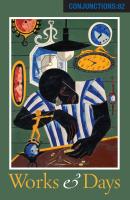![[A Conjunctions Reading at Prairie Lights]](http://www.conjunctions.com/images/event_image.php?id=129860) IOWA CITY, IA—On Wednesday, November 11, at 7:00 p.m., the legendary indie bookstore Prairie Lights (15 South Dubuque Street) will hold a reading celebrating the provocative, innovative literary journal Conjunctions, featuring contributors John D'Agata and Elizabeth Willis.
IOWA CITY, IA—On Wednesday, November 11, at 7:00 p.m., the legendary indie bookstore Prairie Lights (15 South Dubuque Street) will hold a reading celebrating the provocative, innovative literary journal Conjunctions, featuring contributors John D'Agata and Elizabeth Willis.This will be the second event in Conjunctions' new Cities Series, which brings the journal's writers and readers face to face in independent bookstores across the country, paying homage to the rich regional diversity of our literary landscape.
The reading is free and open to the public. No tickets or reservations are required, but seating is first come, first served. Prairie Lights will be the first bookstore in the nation to offer copies of Conjunctions:65, Sleights of Hand, The Deception Issue (Fall 2015), which features work by Laura van den Berg, Porochista Khakpour, Rae Armantrout, Can Xue, Joyce Carol Oates, Eleni Sikelianos, Terese Svoboda, Yannick Murphy, and many others.
Published by Bard College and edited by the novelist Bradford Morrow, Conjunctions appears in a biannual print and e-book edition of fiction, poetry, and narrative nonfiction, and as a weekly online magazine of web-exclusive content. In its pages, contemporary masters meet radical new voices through the investigation of themes such as exile, erasure, obsession, doppelgängers, impossible realism, cinema, or dark comedy. It's a compilation of works that are at once feverishly imagined and immaculately executed, a space for writing fearlessly and reading dangerously.
Karen Russell calls Conjunctions "a translation into a multiverse of stories and poems and essays and even weirder hybrid forms, the mutant menagerie of literary fiction. It's a place to take risks, an oasis for wonder." And Rick Moody adds, "Without a doubt, Conjunctions is the best literary magazine in America."
Prairie Lights (@prairie_lights) is celebrated across the country as one of the very greatest of our brick-and-mortar bookstores. Founded in 1978, the store has long been a thriving literary salon for writers as renowned as Carl Sandburg, Robert Frost, Sherwood Anderson, Langston Hughes, and e e cummings. In addition to the astonishing curation of titles on Prairie Lights' shelves, the Live from Prairie Lights reading series brings a host of established and up-and-coming writers—Michael Chabon, Marilynne Robinson, Daniel Alarcón, Reza Aslan, Francine Prose, Judith Thurman, and countless others—to audiences in Iowa City and, via live streaming, across the world. For questions about the Conjunctions reading, call 1-800-295-BOOK or 319-337-2681.
JOHN D'AGATA's books include Halls of Fame, a collection of experimental nonfiction on everything from Henry Darger to Deep Springs College ("In nothing else recent is the compresence of shit and light that is America so vividly felt and evoked ... [D'Agata is] one of the most significant US writers to emerge in the past few years." —David Foster Wallace); About a Mountain, a book-length essay about the Yucca Mountain nuclear waste repository ("A brilliant, sorrowful book ... The literary essay raised to the highest form of art." —Ben Marcus); and, most recently, The Lifespan of a Fact, his hotly debated collaboration with Jim Fingal about the in/violability of facts in nonfiction ("Provocative, maddening, and compulsively readable." —Maggie Nelson). He is also the editor of The Next American Essay, The Lost Origins of the Essay, and the forthcoming The Making of the American Essay.
ELIZABETH WILLIS’s most recent collection of poetry is Alive: New and Selected Poems, about which Library Journal wrote: "Willis offers the penetrating musings and sometimes fragmented syntax of a contemporary Emily Dickinson but can feel like a spirited surrealist … Grab it." Her other books include Address ("Humorous, political, engaged, and deeply resonant―at the end you’ll start again." —Brooklyn Rail); Meteoric Flowers ("Gorgeous ... intoxicating ... surprising and mysterious." —Jacket); Turneresque ("It seems—to borrow one of its own phrases—'to imply or intone the whole possibility of human sun.'" —Cole Swensen); The Human Abstract ("These poems move with an uncanny precision to sound thought and the body it makes manifest. No one speaks more clearly in such subtle webs of feeling. Nor is there any other who can so bring us home. Elizabeth Willis is a master." —Robert Creeley); and Second Law ("In these linked fragmentary linguistic structures Elizabeth Willis enters Bunyan's emblematic river another time; singing." —Susan Howe). She is the editor of Radical Vernacular: Lorine Niedecker and the Poetics of Place and the winner of the PEN New England / L. L. Winship Prize for Poetry.
